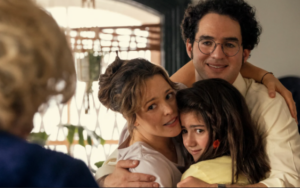ARE YOU THERE GOD? IT’S ME MARGARET: 4 STARS. “curiosity and innocence.”
 For several generations of young people “Are You There God? It’s Me, Margaret,” Judy Blume’s iconic coming-of-age novel, has been required reading. First released in 1970, when it wasn’t being banned by reactionaries upset by its frank talk about menstruation and religion, it was heralded as a realistic and relatable story of adolescent anxieties.
For several generations of young people “Are You There God? It’s Me, Margaret,” Judy Blume’s iconic coming-of-age novel, has been required reading. First released in 1970, when it wasn’t being banned by reactionaries upset by its frank talk about menstruation and religion, it was heralded as a realistic and relatable story of adolescent anxieties.
A new movie of the same name, now playing in theatres, hopes to uphold the book’s wholesome tone, while preserving the plain-spoken nature of “the poet laureate of puberty,” Blume’s prose.
The story begins when New York City preteen Margaret Simon’s (Abby Ryder Fortson) parents,
Barbara and Benny (Rachel McAdams and Benny Safdie), announce they are leaving the city. Benny has been given a promotion, and being in New Jersey makes more sense.
“It’s just on the other side of the river,“ he says, but even though It’s just the other side of the Hudson, but it might as well be the other side of the Earth to Margaret. She’s afraid she’ll never see friends again and doesn’t want to start at a new school. Grandmother Sylvia (Kathy Bates) doesn’t make things better when she moans, “I’m never going to see you again!“
Alone in her room, Margaret prays, “I’ve heard a lot of great things about you,” she says. “I don’t want to move. I’ve never lived anywhere but the city. If you can’t stop the move, please don’t let New Jersey be too miserable.“
As it turns out, the family’s new, leafy suburb isn’t that bad. There isn’t a pizzeria for miles around, but the neighbors are friendly, including the extroverted mean-girl-in-training Nancy Wheeler (Elle Graham), who pops by on moving day. “I live in the bigger house down the street,” she announces, before inviting Margaret to join her secret club.
Inside this new, small circle of friends, Margaret begins to figure out her place in the world. It’s a time of adjustments, of firsts—first bra, first crush, first kiss, first period, first betrayal—and of a spiritual quest. As the daughter of a Jewish father and Christian mother, who elected not to make her choose a religion until she got older, Margaret forms her own special relationship with God.
“It’s finally time to figure out who I am to be,” she says.
All the highlights from the book “Are You There God? It’s Me, Margaret,” including the famous “We must, we must, we must increase our bust” mantra and her famous prayers are present. Director Kelly Fremon Craig, who also wrote the screenplay, maintains the lack of pretence and sense of authenticity that set Blume’s book apart from the pack in this gentle realization of Margaret’s story.
The film perfectly captures Margaret’s tentative steps into adolescence and the life-changing power that comes along with each of her discoveries. It’s a trip into self-acceptance at a very complicated time in her life as she grapples with relationships—with her anti-religion parents, her new friends and Moose, the cute boy from down the street—and situations she struggles to understand. Like the book, which runs an economical 149 pages, the movie is a small story that tackles big issues.
Fortson delivers a natural performance, tinged with curiosity and innocence, that authentically delivers the good-natured humour and deeply felt emotions that color Margaret’s journey.
Set in the 1970s, “Are You There God? It’s Me, Margaret” captures the nostalgia of the era, complete with McAdam’s feathered Farrah Fawcett hair, unironic TV dinners, fluorescent folding lawn chairs and shag carpets, but they all serve the movie’s themes, which are timeless.
